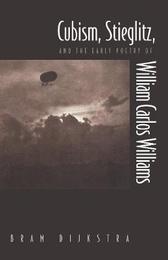
|
Cubism, Stieglitz, and the Early Poetry of William Carlos Williams
Paperback / softback
Main Details
| Title |
Cubism, Stieglitz, and the Early Poetry of William Carlos Williams
|
| Authors and Contributors |
By (author) Bram Dijkstra
|
| Physical Properties |
| Format:Paperback / softback | | Pages:256 | | Dimensions(mm): Height 203,Width 127 |
|
| Category/Genre | Art and design styles - Cubism
Literary studies - from c 1900 -
Literary studies - poetry and poets |
|---|
| ISBN/Barcode |
9780691013459
|
| Classifications | Dewey:811.52 |
|---|
| Audience | | Professional & Vocational | | Tertiary Education (US: College) | |
|---|
| Illustrations |
13 line drawings 17 halftones
|
|
Publishing Details |
| Publisher |
Princeton University Press
|
| Imprint |
Princeton University Press
|
| Publication Date |
21 July 1978 |
| Publication Country |
United States
|
Description
Previous studies of William Carlos Williams have tended to look at the literary echoes in his verse. According to Bram Dijkstra, the new movements in the visual arts during the 1920s affected Williams' work as much, if not more than, the new writing of the period. Dijkstra aims to catch the excitement of this period of art and reveal the interactions between writers and painters, and show in particular the specific and general impact this world had on Williams' early writings.
Author Biography
Bram Dijkstra is Professor of American and Comparative Literature at the University of California, San Diego. He is the author of numerous books, including Georgia O'Keeffe and the Eros of Place, Evil Sisters: The Threat of Female Sexuality and the Cult of Manhood, Defoe and Economics: The Fortune of Roxana in the History of Interpretation, and Idols of Perversity: Fantasies of Feminine Evil in Fin-de-Siecle Culture.
Reviews"Dijkstra has demonstrated beyond any doubt that Williams was enormously influenced by experimentation in the visual arts and that he attempted to emulate the Stieglitz group in focusing on the object itself, delineating it as precisely as possible and letting it represent the moment of perception without intruding personal comment."--Comparative Literature
|